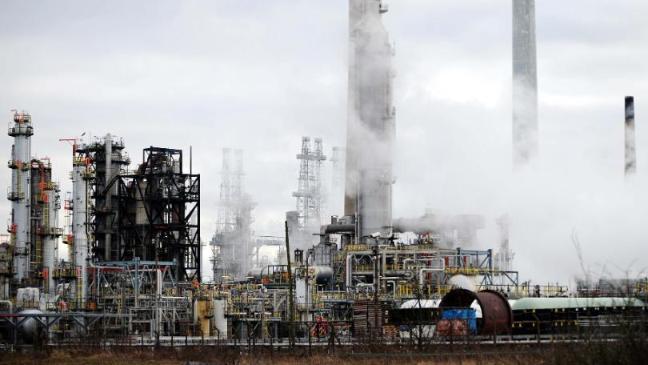On 10th April it was widely reported that a small oil company claims to have found up to 100 billion barrels of oil below the Weald region of southern England. They estimate that up to 15 billion barrels is recoverable, about as much as Brazil's proved reserves. They base this on a single drill site with no flow measurements. For anyone who knows anything at all about geology, this is beyond ludicrous. Yet the monstrous piece of hype went without challenge at the top of the TV news bulletins I saw through the day, even as the company's share price soared through the roof: no doubt the point of the exercise. In the evening, I had a call from a radio station asking for an interview about how the UK should spend all the money. This is the kind of thing that those of us who long for a managed retreat from default fossil-fuel addiction are up against. In my serialised book I offer one person's view of how such crazy manipulations of the public arise. I chronicle and explain the dangers of the "shale boom" that is in the process of going bust in America, and the risks of trying to import that recipe for a financial black hole to the UK and other countries, even if UK shale proves to be as briefly productive as US shale. Here is an extract from the book. When reading it, it is worth remembering that Shell had to write off more than $2 billion in US shale in 2013. The then CEO, Peter Voser, later said that he greatly regretted his decision to pursue shale, and that those involved in shale should expect "negative surprises" as the narrative plays out. It is interesting to observe that that no major oil and gas company has a significant investment in UK shale.
The Winning of The Carbon War -----------------------------
Mayfair, London, June 12th, 2014Free download here A conference organised by the Financial Times and the International Finance Corporation. A panel with Shell, GE, and Macquarie Bank. The Shell man, Wim Thomas, is chief energy advisor. The GE man, Ganesh Bell, is Chief Digital Officer. The Macquarie man, Simon Wilde, is a Senior Managing Director. The dire but typical gender balance is partially repaired by chair Pilita Clark, the FT’s environment correspondent and leader of the paper’s energy team. We have an interesting title to guide our discussion: “Energy: doom, boom, or bust.” Wim Thomas had his marching orders set on May 16th, in the form of a letter sent to all shareholders. “To whom it may concern,” it reads, “we are writing this letter in response to enquiries from shareholders regarding the ‘carbon bubble’ or ‘stranded assets’ issue.” It goes on to argue that there is nothing for an investor to worry about in these concepts. “The world will continue to need oil and gas for many decades to come, supporting both demand, and oil & gas prices. As such, we do not believe that any of our proven reserves will become ‘stranded’.” The whole concept is “fundamentally flawed”, Shell concludes. And worse, “there is a danger that some interest groups use it to trivialise the important societal issue of rising levels of C02 in the atmosphere.” Carbon Tracker is not named, but it is clear who they must be targeting with this comment. I have been accused of many things by the incumbency over the years. Trivialising global warming is a first. The notion of stranded assets is flawed because of “a failure to acknowledge the significant projected growth in energy demand, the role of CCS, natural gas, bioenergy and energy efficiency measures. Energy demand growth, in our view, will lead to fossil fuels continuing to play a major role in the energy system – accounting for 40-60% of energy supply in 2050 and beyond, for example. The huge investment required to provide energy is expected to require high energy prices, and not the drastic price drop envisaged for hydrocarbons in the carbon bubble concept.” They leave a major hostage to fortune by admitting they need high energy prices to justify investment in their vision. It would be interesting to watch Shell react if oil prices drop. There are other gaping holes in their argument. Carbon Tracker does not think that carbon-fuel assets can only be stranded a low oil price, as would be obvious to anyone who read our reports. High prices can strand assets just as well as low prices, in a world of such fast-falling alternative-energy prices. So too can air pollution legislation. As for relying on climate negotiators to achieve nothing of note for decades, while carbon fuels barrel on providing the majority of the world’s energy, how can Shell dismiss the risk of a different outcome? What a huge assumption to make that the destabilisation of the climate system, so evident for those with the eyes to see it today, will not at some point trigger a survival reflex in society. What an insult to the hundreds of climate negotiators from dozens of countries who are acting in good faith at the climate negotiations, trying to find ways to agree and enforce emissions. Shell’s response to our oil report is very similar to ExxonMobil’s in its contempt for the climate negotiations and their prospects. Today we see unsurprising evidence that oil companies have been colluding. The industry association IPIECA, speaking for many companies, publishes a “fact sheet” on its website echoing the main points made by ExxonMobil and Shell in their responses to Carbon Tracker’s work. The members of the panel take turns to set out our stalls. Wim Thomas has an interesting spin on the Shell party line. Solar will indeed become the world’s dominant energy source, he says. By 2070. By then, we will still need a lot of carbon capture and storage to handle all the fossil fuels we will be using. There will be lots of gas consumption still. In the discussion, steered by Pilita Clark quickly to the heart of the issue, I find myself in a situation I have never been in before in these four-person panels: on the majority side, contesting a minority of one. Normally it is me who is the minority of one. GE’s chief digital officer, Ganesh Bell, is a creature of Silicon Valley through and through. He talks enthusiastically about the “internet of things”, meaning the notion - increasingly aired in visions of tomorrow - of objects of all kinds being embedded with electronics, software, sensors and connectivity to make a network that allows exchanges of data between manufacturers, operators and/or other connected devices. The network of “things” becomes all the more valuable and serviceable because of its interconnectivity. Wait until all this hits decentralised energy fully, Ganesh Bell says. Stand back and watch how fast the disruption of everything traditional will be: in energy, data management, economics and much else. He doesn’t spell it out, but it is clear that he doesn’t see Shell factoring much of this kind of thinking into their version of the future. Macquarie Bank’s man, Simon Wilde, is little less enthusiastic about his vision for tomorrow. Where better to look for growth opportunities to invest in, he enthuses. Renewables are generally way ahead of carbon fuels on his list, especially when you throw in all the smart energy opportunities. He only sees that accelerating. Wim Thomas does his best, but as he speaks, sitting next to me, I slowly develop the impression that the Shell man is not comfortable in his own skin today. He is relaying a party line that he does not have total confidence in. I offer my thoughts about how neuroscience plays against rational patterns of behaviour in big corporations. Thomas is not entirely defensive, and even concedes some truth in the analysis, based on his own experience. But we will still need to depend on fossil fuels for a very long time, he adds. And the risk of stranded assets? There is a “slight exaggeration” in that narrative, he suggests. So I am not trivialising anything, I am tempted to ask him. Your employer’s letter to shareholders didn’t seem to see anything “slight” in Carbon Tracker’s exaggeration. It occurs to me that I have been here before. From 1990 until 1997, throughout the first seven years of international climate negotiations, BP had stood full square alongside Exxon Mobil, Shell, and the other oil giants in denying that climate change is anything to worry about. The world needed “sound science” before rushing to judgement, they said, as though the hundreds of scientists in the Intergovernmental Panel on Climate Change, and their exhaustive processes of peer review, were incapable of providing it. Then, in May 1997, everything changed. The BP CEO of the day, John Browne, gave a mea-culpa speech at Stanford University. It was pointless for oil companies to argue that climate change wasn’t a grave problem, he said. The evidence was becoming too clear. BP would henceforth be joining the growing number of companies wanting to do something meaningful about emissions. BP’s U-turn galvanised the climate talks for the rest of that year, just at the right time ahead of the Kyoto climate summit in December, where the world’s first emissions limitations were finally agreed. I describe this passage of history in The Carbon War. As BP’s internal discussions raged between advocates of reform and entrenchment in the run up to Browne’s game-changing speech, I noticed that the BP executives I debated in public, and conferred with in private, looking increasingly uncomfortable with the party line. They knew that, behind the company’s closed doors, the blocking narrative was eroding. They gave this away in all sorts of ways. Now, as then, evidence is becoming increasingly clear all around those who seek to entrench the incumbency in its old ways. Perhaps most notably, as they seek to justify their own performance and downplay the opposition’s, the oil and gas industry’s tendency for hype is being exposed on an increasingly regular basis. The most recent example from the American shale is particularly shocking. The Monterey Shale in California was promoted in a 2011 report by a supposedly independent consultancy firm working for the US government’s Energy Information Administration as a huge oil play, with more than 13 billion barrels of oil recoverable. The release of this conclusion made news headlines all over the world. Since the estimate meant fully two thirds of all American shale oil reserves were now in the Monterey Shale, it was the core of the “Saudi America” mantras pushed by the industry and its cheerleaders at the time. David Hughes, ex Canadian Geological Survey veteran, fellow of the Post Carbon Institute and member of the Transatlantic Energy Security Dialogue, began painstaking work to check the estimates the consultancy had made in the Monterey Shale. He came up with a very much smaller figure for recoverable oil. On May 21st, the Energy Information Administration was forced to agree with him. They let it be known that the reserves estimate for recoverable Monterey oil needed to be revised down by a somewhat inconvenient ninety six percent. Let me repeat that, for fear of typos. Ninety six percent. This announcement, needless to say, did not make headlines around the world the way that the original report had. On top of such revelations, and the billions Shell has written off in the shale, and are likely soon to have to write off in Kashagan, in the Arctic, and in tar sands projects, comes the evidence people like Wim Thomas will be seeing of the progressive pegging back of the frontiers that the industry needs to be active on today if it is to deliver the majority of energy to a world “many decades from now”. The example the same day as the shock announcement about the Monterey Shale was that the first Californian county, Santa Cruz County, had banned fracking completely. Some diehard incumbency defenders might take comfort from how strongly the industry’s supporters in politics are fighting for them, of course. Nowhere more so than the UK. The same day of the shale-oil shock in California, the Telegraph ran a front-page headline announcing that “Ministers signal start of great oil rush” in Britain. This polar opposite to what international business editor Ambrose Evans-Pritchard is writing in the business pages of the Conservative paper these days was based on a report by the British Geological Survey, soon to be published, announcing billions of barrels of recoverable oil under the Weald of Kent, Sussex and Surrey. To access this oil, the government would apparently be allowing the industry to drill under peoples’ homes without their permission, and would increase average compensation to communities undergoing fracking to £800,000. Notwithstanding this effective bribe, residents reacted angrily, immediately. It struck me as incredible that the government thought they would be able to force this ghastly brew of undemocratic policies past their own voter base in the Conservative heartland. On May 23rd, the actual British Geological Survey report became available, so that the government’s description of it could be verified. Verification proved to be needed. There is in fact no recoverable shale gas under the Weald, the Survey concludes, and very little recoverable oil, in all probability. Reading this, I had to take my dog for a walk and have have a very deep think. There is, it seems to me, much more than failure of rational thought at work in all this drama. There is a whiff of real delusional madness in the air. At the FT debate - “doom, boom, or bust” - I wonder if I am debating with someone from Shell who might be harbouring the first faint germs of similar thoughts.  *** By Dr Jeremy Leggett: Chairman of Solar Century, Founder and Chairman, Solarcentury & SolarAid, Chairman, CarbonTracker & Firefly Clean Energy The Winning of The Carbon War Free download here




